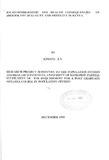| dc.contributor.author | Kimani, JN | |
| dc.date.accessioned | 2013-05-07T08:26:12Z | |
| dc.date.available | 2013-05-07T08:26:12Z | |
| dc.date.issued | 1995-12 | |
| dc.identifier.citation | Post-graduate diploma thesis,university of nairobi (1995) | en |
| dc.identifier.uri | http://erepository.uonbi.ac.ke:8080/xmlui/handle/123456789/19624 | |
| dc.description | A Post Graduate Diploma Course in Population Studies | en |
| dc.description.abstract | The main objective of the study was to find out the extent to
which adolescent fertility affects the socio-demographic and health
scenario in Kenya. The study examined adolescent fetility among
secondary school girls. Analysis was made of
1. Age at which adolescents engage in sex.
2. Measures adolescents take to ensure safe sex.
3. Pregnancy outcomes of unwanted pregnancy.
4. Health implications of adolescent pregnancy.
5. Safety chances of the abortions performed by adolescents.
The study findings are;
1. A big percentage of girls engage in early sex.
2. Sex is unplanned, hence unsafe sex.
3. Large portion of unwanted pregnancies lead to abortion.
4. Abortions and early pregnancy lead to multiple health problems.
5.Most of the abortions are unsafe and carried out by unqualified personnel. This
affects the general welfare of the adolescents and their
future chances in life.
The last part of the study puts forth recommendations that are
pertinent to policy-making. The main recommendation is that
adolescent fertility should be regarded a serious problem and
programmes and polices be designed to curb the factors contributing
to the high adolescent fertility in Kenya. | en |
| dc.language.iso | en | en |
| dc.publisher | University of Nairobi | en |
| dc.title | Socio-demographic and health consequencies of adolescent sexuality and fertility in Kenya. | en |
| dc.type | Thesis | en |
| local.publisher | Population Studies and Research Institute | en |

